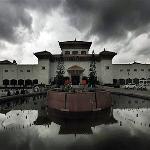29 July 2010

Photo: AP
Dark clouds loom over Nepal's Constitutional Assembly building as a fresh vote for a new leader was ordered by House Speaker Subash Nemwang after none of three candidates managed to get a majority vote in the 601-seat parliament, Nepal, 23 July 2010
Nepal's former Prime Minister Madhav Kumar Nepal resigned last month after Maoists led massive protests demanding that he make way for a power sharing government.
But despite weeks of negotiations, the three main political parties – the Maoists, the Nepali Congress, and the Communist Party known as UML have failed to reach a consensus on who should head a new government.
Lawmakers have voted twice to elect a prime minister. But neither the Maoist leader, popularly known as Prachanda, nor the Nepali Congress candidate, Ram Chandra Poudel, could win a majority.
2008 election brought peace
The situation is in stark contrast to 2008, when elections were held after a peace deal ended a 10-year violent insurgency and drew Maoist rebels into the political mainstream.
The polls, billed as historic, brought the former guerrillas to the helm of government. Although the Maoists did not win a clear majority in a hung parliament, they easily secured support from other parties. A hopeful mood gripped the nation as it looked ahead to peace and stability.??
But the charisma of the former guerrillas soon faded and the Maoist-led government collapsed in less than a year.
No cooperation
Political analyst and editor of Nepal's Samay magazine, Yuvraj Ghimre, says their efforts to form a government for the second time are not succeeding because they have been unable to work in cooperation with other parties.
"The Maoists is also in a way isolated or cornered, because when it was heading the government in the past, it basically refused to take suggestion, from any of the coalition partners," Ghimre said. "That is why they are not very willing to support the Maoists."
One of the main points of contention between the Maoists and other political parties is the future of about 20,000 former Maoist fighters, who are currently confined in U.N.-supervised camps. The Maoists want them integrated into the army, but other parties are refusing.
The infighting among the main parties has held up the main task with which parliament was entrusted – the writing of a new constitution for the country. Parliament's tenure was extended by a year after it missed the May 2010 deadline for writing the constitution.
New constitution
But the continuing political impasse has raised worries whether the constitution can be framed by next year.
Kunda Dixit, editor of Nepali Times, says the three main parties are refusing to step aside because they want a decisive say in the writing of the new constitution.
"This is especially true of the Maoists, who feel that if they are not in power, then the constitution will not be according to what they want," said Dixit. "This is why there is a real scramble for leadership and there is a real power struggle, which is reflected in the deadlock in the election in parliament."
The lack of political consensus has led to a virtual political paralysis in the country.
Parliament has not functioned for almost six months. The national budget has not been passed, the economy is stagnant, and development is at a standstill in one of the world's poorest nations.
Frustrating situation
Kunda Dixit says anger, outrage, and frustration are rising among ordinary people as political parties fail to sink their political ambitions, and resolve the deadlock.?
"They feel like the parties are so selfish they can't even work together," Dixit added. "There are these radio talks shows where people calling in from all over the country, and every one of those callers is abusing the politicians like anything."??????
Parliament is now scheduled to meet next week for a third time to choose a new leader – but this round too is widely expected to end in a deadlock.
Political analysts say if that happens, the two present candidates for the prime minister's post are likely to step down and make way for others who might be able to build a consensus.
But there are fears that even when a new government does get eventually elected, political differences and bickering could endanger the fragile peace process.